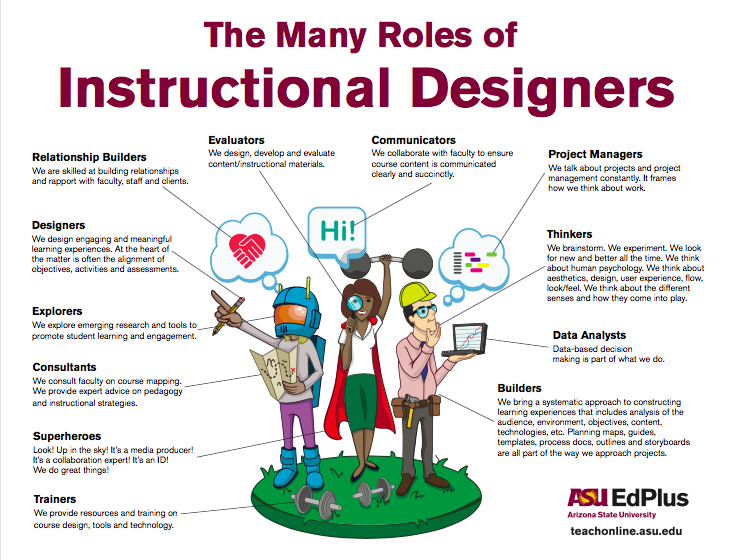Find your instructional designer by clicking this link. If your academic unit does not have its own Instructional Designer, never fear! The Online Curriculum and Digital Innovation team is here! Email Kena at thecollegeonline@asu.edu.
Instructional Design
Instructional design is a systematic process used for developing learning experiences. The instructional design process can begin at any stage of development: from a glimmer of an idea to an evaluation of a course that has been taught for decades.
The instructional design process includes the following tasks, most of which are revisited again and again throughout the design cycle:
-
analysis of learning needs
-
creating specifications for learning needs (objectives)
-
planning, selecting, and creating the content that best meets objectives
-
selecting assessment strategies that measure the achievement of objectives
-
implementing technologies to increase students' social and cognitive presence
-
evaluating the effectiveness at the end of the course/ training
In each course development, you will find situations in which you ask yourself, "What should I do here?" Keep in mind that there may be many effective answers and solutions.
About Instructional Designers
At ASU, IDs typically partner with instructors to design and build courses. Many IDs also design and deliver trainings to faculty and staff. IDs are skilled at translating instructors' expertise into deliverables for learners by following an iterative process backed by learning science.
IDs help instructors develop engaging, effective, high-quality learning experiences. IDs have graduate degrees or equivalent experience in higher education, adult education and training, instructional technology, or related fields. They have expertise in learning theory, knowledge acquisition and retention, instructional best practices, and quite often, media production.
To work as an ID at ASU, ideal candidates must have 3 years of Instructional Design experience, preferably in higher education.
Among the many hats IDs wear are communicators, guides, content writers, graphic designers, analysts, project managers, new frontier explorers, people connectors, and relationship builders: it's an academic, scientific, and artistic endeavor.
Interested in sharpening your instructional design prowess? Take ASU's Continuing Ed course, Practical Instructional Design - Alumni.
Here's a widely-circulated report on the role, workflow, and experience of instructional designers: Instructional Design in Higher Education
Instructional Design vocabulary
If you are new to instructional development and design, you have no doubt heard some new-to-you vocabulary and acronyms. The following terms relate specifically to the process of instructional design and are essential to the work completed by our team.
|
ADDIE |
Analysis, design, development, implementation, and evaluation-a general model for instructional design |
|
Bloom’s taxonomy |
A system of categories for classifying instructional objectives according to two dimensions: cognitive process and types of knowledge |
|
Learning |
The use of knowledge, as opposed to the acquisition of knowledge |
|
Instruction |
The guidance necessary to help learners use knowledge; instruction is always aligned to desired outcomes, or objectives. |
|
Objective |
The desired learning outcome that aligns to a specific assessment or activity within a course and the focal point of all course development processes |
|
Assessment |
The general name for any assignment in a course for which points are awarded, including papers, quizzes, presentations, discussions, and so on |
|
Goal |
The desired outcome that aligns to the course as a whole, not any particular assessment or activity; broader in scope than objectives |
|
Alignment |
When students are provided with sufficient guidance to perform the assessment, and the assessment outcome is a reliable measure of students' learning as related to the objective |
| Pedagogy |
teaching methods for effectively delivering learning content |
